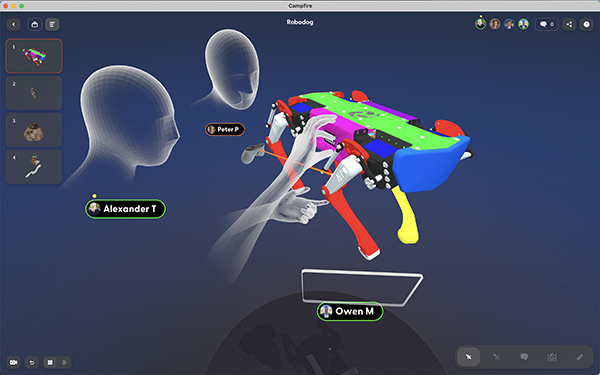Apple Vision Pro and Quest 3 headsets unlock virtual collaboration for the physical economy.

San Diego, CA – Campfire announces support for Apple Vision Pro following growth in its customer base of more than fifty times (50X) since supporting Meta Quest 3. This growth reflects a dramatic gain in usability on Meta Quest 3 compared to previous devices, and overwhelming demand for a new wave of virtual collaboration that can reduce or eliminate travel and shipping for work that requires interaction with the physical world.
While virtual collaboration is now commonplace, it does not meet the needs of companies in the physical economy whose workers must interact with physical products, equipment, and environments to get their jobs done. Whether for design reviews, sales calls, or training sessions, people must travel and products must be shipped to meeting locations, resulting in significant time and expense.
With the Campfire platform, physical products and places can be shared digitally with users around the world as if they were sitting around or within them. Travel and shipping costs can be largely eliminated resulting in an ROI measured in weeks or months, not years. Core business processes can be accelerated and enhanced, including:
“Spatial collaboration is a disruptive capability that has been promised and not delivered for too long. Meta’s Quest 3 has defined an inflection point for headset adoption in the enterprise, and customers are excited about what’s possible with Apple Vision Pro.” said Jay Wright, Campfire CEO and Co-founder. “Companies can finally share 3D models as easily as 2D documents to realize productivity gains that have remained elusive with previous technologies.”
Campfire’s growth has occurred throughout the physical economy from startups through industry leaders including Raytheon, Collins Aerospace, KTM, PepsiCo, Harvard University, and Arup. Industries range from aerospace & defense, oil & gas, transportation, construction, industrial equipment, education, to consumer products. Numerous customers who have experimented with other immersive solutions in the past are engaged for multiple projects across different workflows.
“We’ve been building our own apps for AR and VR headsets for years, but there’s still too much friction getting users into headsets and building custom apps. Campfire and Quest 3 reduces friction on both fronts. We can now show clients our work without writing a line of code and users are far more comfortable with Quest 3 because of passthrough,” said Anthony Cortez, Lead Visualization Specialist at ARUP.
About Campfire
Campfire revolutionizes virtual collaboration for the physical economy. Instead of traveling and shipping equipment for meetings, distributed teams can collaborate using digital 3D models of physical products, equipment, and environments as if sitting around them. Campfire supports more than 40 types of CAD/3D models and allows users to collaborate from desktops, tablets, and a new generation of spatial computing devices. Customers in more than 70 countries are rapidly adopting Campfire for product development, sales and marketing, and training to reduce costs and accelerate core business processes. Campfire was founded by augmented reality industry pioneers and is based in San Diego, CA. More information is available at campfire3d.com.
Media Contact:
Beth Handoll
beth@handollPR.com
Scott Ellyson, CEO of East West Manufacturing, brings decades of global manufacturing and supply chain leadership to the conversation. In this episode, he shares practical insights on scaling operations, navigating complexity, and building resilient manufacturing networks in an increasingly connected world.